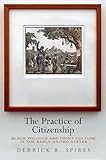The Practice of Citizenship : Black Politics and Print Culture in the Early United States / Derrick R. Spires.
Material type: TextPublisher: Philadelphia : University of Pennsylvania Press, [2019]Copyright date: ©2019Description: 1 online resource (352 p.) : 10 illusContent type:
TextPublisher: Philadelphia : University of Pennsylvania Press, [2019]Copyright date: ©2019Description: 1 online resource (352 p.) : 10 illusContent type: - 9780812295771
- African Americans -- Political activity -- History -- 18th century
- African Americans -- Political activity -- History -- 19th century
- American literature -- African American authors -- History and criticism
- American literature -- 18th century -- History and criticism
- American literature -- 19th century -- History and criticism
- Citizenship in literature
- Citizenship -- United States -- History -- 18th century
- Citizenship -- United States -- History -- 19th century
- History-African American
- Interdisciplinary-African American Studies
- LITERARY CRITICISM / Subjects & Themes / Politics
- African Studies
- African-American Studies
- American History
- American Studies
- Cultural Studies
- Literature
- citizenship
- print culture
- 323.1196/073 23
- E185.18
- online - DeGruyter
| Item type | Current library | Call number | URL | Status | Notes | Barcode | |
|---|---|---|---|---|---|---|---|
 eBook
eBook
|
Biblioteca "Angelicum" Pont. Univ. S.Tommaso d'Aquino Nuvola online | online - DeGruyter (Browse shelf(Opens below)) | Online access | Not for loan (Accesso limitato) | Accesso per gli utenti autorizzati / Access for authorized users | (dgr)9780812295771 |
Frontmatter -- CONTENTS -- Introduction. Black Theorizing: Reimagining a “Beautiful but Baneful Object” -- Chapter 1. Neighborly Citizenship in Absalom Jones and Richard Allen’s A Narrative of the Proceedings of the Black People During the Late and Awful Calamity in Philadelphia in the Year 1793 -- Chapter 2. Circulating Citizenship in the Black State Conventions of the 1840s -- Chapter 3. Economic Citizenship in Ethiop and Communipaw’s New York -- Chapter 4. Critical Citizenship in the Anglo-African Magazine, 1859–1860 -- Chapter 5. Pedagogies of Revolutionary Citizenship -- Conclusion. “To Praise Our Bridges” -- Notes -- Bibliography -- Index -- Acknowledgments
restricted access online access with authorization star
http://purl.org/coar/access_right/c_16ec
In the years between the American Revolution and the U.S. Civil War, as legal and cultural understandings of citizenship became more racially restrictive, black writers articulated an expansive, practice-based theory of citizenship. Grounded in political participation, mutual aid, critique and revolution, and the myriad daily interactions between people living in the same spaces, citizenship, they argued, is not defined by who one is but, rather, by what one does.In The Practice of Citizenship, Derrick R. Spires examines the parallel development of early black print culture and legal and cultural understandings of U.S. citizenship, beginning in 1787, with the framing of the federal Constitution and the founding of the Free African Society by Absalom Jones and Richard Allen, and ending in 1861, with the onset of the Civil War. Between these two points he recovers understudied figures such as William J. Wilson, whose 1859 "Afric-American Picture Gallery" appeared in seven installments in The Anglo-African Magazine, and the physician, abolitionist, and essayist James McCune Smith. He places texts such as the proceedings of black state conventions alongside considerations of canonical figures such as Frances Ellen Watkins Harper and Frederick Douglass.Reading black print culture as a space where citizenship was both theorized and practiced, Spires reveals the degree to which concepts of black citizenship emerged through a highly creative and diverse community of letters, not easily reducible to representative figures or genres. From petitions to Congress to Frances Harper's parlor fiction, black writers framed citizenship both explicitly and implicitly, the book demonstrates, not simply as a response to white supremacy but as a matter of course in the shaping of their own communities and in meeting their own political, social, and cultural needs.
Mode of access: Internet via World Wide Web.
In English.
Description based on online resource; title from PDF title page (publisher's Web site, viewed 25. Jun 2024)


